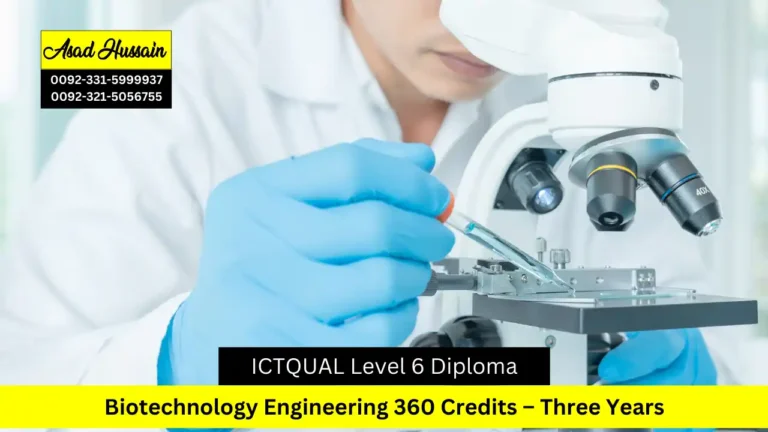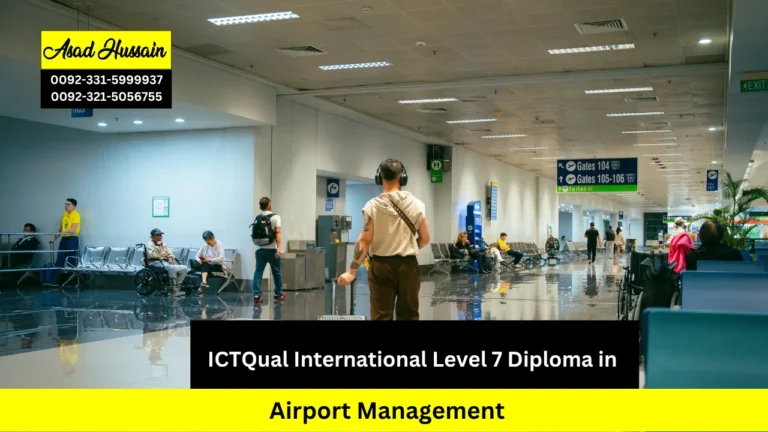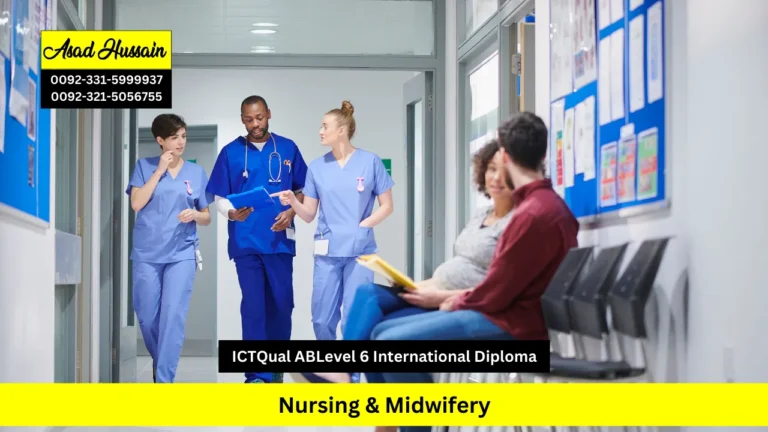In today’s fast-evolving healthcare landscape, radiology and imaging technology play a pivotal role in accurate diagnosis, treatment planning, and patient care. The ICTQual AB Level 6 International Diploma in Radiology & Imaging Technology equips learners with advanced knowledge and practical skills essential for a successful career in diagnostic imaging. This internationally recognized program provides an in-depth understanding of radiological procedures, imaging modalities, radiation safety, and modern diagnostic technologies.
The ICTQual AB Level 6 International Diploma in Radiology & Imaging Technology blends theoretical instruction with hands-on practice, enabling learners to master imaging techniques such as X-ray, MRI, CT, and ultrasound, while ensuring adherence to professional safety standards. Participants will gain expertise in patient positioning, image interpretation, and quality assurance processes, preparing them to work confidently in hospitals, diagnostic centers, and specialized imaging facilities.
Designed for healthcare professionals, technicians, and graduates seeking specialization in medical imaging, this diploma enhances employability and career progression globally. The program also emphasizes emerging technologies and best practices in radiology, ensuring learners stay at the forefront of the field. By completing this diploma, participants receive a British Council verifiable, MOFA and Embassy attestable certification, highly valued for career opportunities, job placements, and professional recognition worldwide.
Program Highlights
Study Units
Year 1: Foundation in Radiology & Imaging Technology
- Introduction to Radiology and Imaging Sciences
- Human Anatomy and Physiology for Imaging
- Principles of Physics in Medical Imaging
- Fundamentals of Radiographic Techniques
- Radiation Safety and Protection
- Introduction to Medical Imaging Modalities
- Patient Care and Communication Skills
- Basic Medical Terminology
- Laboratory Safety and Quality Assurance
- Introduction to Imaging Equipment Operation
- Medical Ethics and Professional Conduct
- Research Methods in Healthcare
Year 2: Intermediate Radiology Applications
- Advanced Radiographic Techniques
- Computed Tomography (CT) Imaging
- Magnetic Resonance Imaging (MRI) Principles
- Ultrasound Imaging Fundamentals
- Nuclear Medicine and Radiopharmacy Basics
- Clinical Radiology and Diagnostic Interpretation
- Imaging Informatics and Digital Systems
- Health and Safety in Imaging Departments
- Patient Assessment and Care in Imaging
- Quality Control and Equipment Maintenance
- Applied Research Methods in Imaging
- Leadership and Teamwork in Radiology Practice
Year 3: Advanced Specialisation and Professional Practice
- Advanced MRI and CT Imaging Techniques
- Interventional Radiology Procedures
- Advanced Ultrasound Applications
- Imaging in Oncology and Cardiology
- Radiology Reporting and Interpretation Skills
- Advanced Radiation Protection Practices
- Biomedical Imaging Technology Integration
- Emerging Trends in Radiology and Imaging
- Clinical Placement / Practical Competency
- Capstone Project / Dissertation in Radiology
- Professional Practice and Reflective Development
- Healthcare Management and Policy in Imaging
To ensure learners are fully prepared to succeed in the ICTQual AB Level 6 International Diploma in Radiology & Imaging Technology, the program has clearly defined entry requirements that cover multiple essential aspects. These include age, educational background, relevant professional experience, and proficiency in the English language.
Age Requirement
- Candidates must be 18 years or older at the time of enrollment.
- Mature learners with relevant healthcare or imaging experience may be considered.
Educational Requirements
- Completion of a Level 5 Diploma or equivalent in Radiology, Medical Imaging, or a related healthcare field.
- Applicants with a bachelor’s degree in healthcare, nursing, or allied sciences are eligible.
Professional Experience
- Minimum of 1–2 years of professional experience in healthcare, radiology, or medical imaging is recommended.
- Experience in patient care, diagnostic procedures, or imaging departments will be advantageous.
English Language Proficiency
- Proficiency in English equivalent to IELTS 5.5 or higher is required.
- Candidates must be able to understand technical terminology and communicate effectively in clinical settings.
By meeting these requirements, learners are well-equipped to handle the academic rigor of the program while also maximizing their career potential in the healthcare and diagnostic imaging industry.
The ICTQual AB Level 6 International Diploma in Radiology & Imaging Technology is designed to provide learners with advanced theoretical knowledge and practical competencies in medical imaging, diagnostic procedures, radiation safety, and healthcare management. This program emphasizes clinical skills, ethical practice, and research application, preparing learners for careers in hospitals, diagnostic centers, and medical imaging research.
Year 1: Foundation in Radiology & Imaging Technology
Introduction to Radiology and Imaging Sciences
- Understand the fundamental concepts of radiology and medical imaging.
- Explain the role of imaging in diagnosis and treatment planning.
- Apply basic principles to clinical imaging scenarios.
Human Anatomy and Physiology for Imaging
- Identify human anatomy relevant to imaging procedures.
- Correlate physiological processes with imaging techniques.
- Use anatomical knowledge to interpret imaging results accurately.
Principles of Physics in Medical Imaging
- Explain the physics principles underlying radiographic and imaging techniques.
- Apply radiation physics knowledge in imaging procedures.
- Measure and evaluate imaging parameters using standard practices.
Fundamentals of Radiographic Techniques
- Perform basic radiographic positioning and exposure techniques.
- Evaluate image quality using measurable criteria.
- Apply standard operating procedures in imaging laboratories.
Radiation Safety and Protection
- Implement radiation safety protocols in clinical practice.
- Monitor and minimize patient and staff radiation exposure.
- Evaluate compliance using measurable radiation safety standards.
Introduction to Medical Imaging Modalities
- Describe various imaging modalities including X-ray, CT, MRI, and ultrasound.
- Apply knowledge of modality selection for diagnostic purposes.
- Assess appropriateness and quality of imaging results using defined criteria.
Patient Care and Communication Skills
- Apply effective communication strategies with patients during imaging procedures.
- Demonstrate patient handling and care protocols.
- Measure patient satisfaction and comfort using feedback mechanisms.
Basic Medical Terminology
- Use accurate medical terminology in imaging reports and documentation.
- Communicate effectively with healthcare professionals using standardized language.
- Evaluate documentation clarity using measurable standards.
Laboratory Safety and Quality Assurance
- Implement laboratory safety protocols in imaging environments.
- Monitor equipment and procedural quality using established benchmarks.
- Evaluate adherence to safety standards using measurable criteria.
Introduction to Imaging Equipment Operation
- Demonstrate correct use of basic imaging equipment.
- Perform routine checks and calibrations according to guidelines.
- Assess equipment operation competency using measurable performance standards.
Medical Ethics and Professional Conduct
- Apply ethical principles in radiology practice.
- Demonstrate professional conduct in clinical and research settings.
- Evaluate adherence to ethical standards using measurable benchmarks.
Research Methods in Healthcare
- Understand fundamental research methodologies relevant to medical imaging.
- Collect and analyse basic imaging data for clinical research.
- Evaluate research outcomes using measurable scientific criteria.
Year 2: Intermediate Radiology Applications
Advanced Radiographic Techniques
- Perform complex imaging procedures with accuracy.
- Optimize imaging parameters for enhanced diagnostic quality.
- Evaluate image quality and outcomes using measurable clinical standards.
Computed Tomography (CT) Imaging
- Understand CT principles and operation.
- Perform CT imaging procedures safely and accurately.
- Assess image quality and diagnostic utility using measurable criteria.
Magnetic Resonance Imaging (MRI) Principles
- Explain MRI physics and image formation principles.
- Apply MRI protocols for different clinical indications.
- Evaluate MRI image quality using defined standards.
Ultrasound Imaging Fundamentals
- Perform basic ultrasound scanning techniques.
- Identify anatomical structures and abnormalities using ultrasound.
- Measure imaging accuracy and diagnostic effectiveness objectively.
Nuclear Medicine and Radiopharmacy Basics
- Understand principles of nuclear imaging and radiopharmaceuticals.
- Apply safe handling and administration of radioactive tracers.
- Evaluate imaging results using measurable diagnostic criteria.
Clinical Radiology and Diagnostic Interpretation
- Interpret imaging studies accurately across modalities.
- Correlate imaging findings with clinical presentations.
- Evaluate diagnostic accuracy using measurable benchmarks.
Imaging Informatics and Digital Systems
- Apply digital imaging systems and PACS effectively.
- Manage and analyze imaging data for clinical use.
- Measure data management and workflow efficiency objectively.
Health and Safety in Imaging Departments
- Implement advanced radiation protection strategies.
- Monitor departmental compliance with safety regulations.
- Evaluate safety protocols using measurable standards.
Patient Assessment and Care in Imaging
- Conduct comprehensive patient assessments prior to imaging procedures.
- Apply patient-centred care techniques effectively.
- Measure care outcomes using objective clinical indicators.
Quality Control and Equipment Maintenance
- Perform quality assurance tests on imaging equipment.
- Identify and correct equipment issues according to standard protocols.
- Evaluate maintenance effectiveness using measurable performance indicators.
Applied Research Methods in Imaging
- Conduct applied research projects in radiology.
- Collect, analyse, and interpret imaging data systematically.
- Evaluate research findings using measurable scientific standards.
Leadership and Teamwork in Radiology Practice
- Demonstrate effective leadership in imaging teams.
- Apply teamwork strategies to optimize departmental performance.
- Measure leadership and teamwork effectiveness using defined benchmarks.
Year 3: Advanced Specialisation and Professional Practice
Advanced MRI and CT Imaging Techniques
- Perform specialized MRI and CT procedures with precision.
- Optimize imaging parameters for complex diagnostic cases.
- Evaluate imaging quality using measurable clinical standards.
Interventional Radiology Procedures
- Apply interventional techniques under imaging guidance.
- Ensure patient safety and procedural accuracy.
- Assess outcomes using measurable clinical success criteria.
Advanced Ultrasound Applications
- Conduct advanced ultrasound imaging for various clinical indications.
- Identify and interpret complex anatomical and pathological findings.
- Measure diagnostic accuracy using objective performance metrics.
Imaging in Oncology and Cardiology
- Apply imaging techniques in cancer and cardiac diagnostics.
- Interpret specialized imaging findings accurately.
- Evaluate clinical outcomes using measurable diagnostic criteria.
Radiology Reporting and Interpretation Skills
- Prepare detailed and accurate imaging reports.
- Communicate findings effectively to clinical teams.
- Assess reporting quality using defined professional standards.
Advanced Radiation Protection Practices
- Implement best practices for radiation safety at advanced levels.
- Monitor and minimize exposure to patients and staff.
- Evaluate compliance using measurable safety indicators.
Biomedical Imaging Technology Integration
- Integrate multiple imaging modalities for comprehensive diagnosis.
- Apply advanced imaging workflows in clinical practice.
- Assess integration effectiveness using objective metrics.
Emerging Trends in Radiology and Imaging
- Identify and apply emerging technologies and innovations.
- Evaluate the impact of new imaging methods on clinical practice.
- Measure adoption and effectiveness using defined benchmarks.
Clinical Placement / Practical Competency
- Demonstrate practical competence in real-world imaging settings.
- Apply theoretical knowledge to clinical scenarios effectively.
- Evaluate performance using measurable clinical assessment criteria.
Capstone Project / Dissertation in Radiology
- Conduct an independent research or applied project in imaging technology.
- Apply advanced knowledge to solve real-world clinical challenges.
- Evaluate project outcomes using measurable academic and clinical standards.
Professional Practice and Reflective Development
- Demonstrate professional practice, ethical conduct, and reflective learning.
- Apply continuous improvement strategies in clinical imaging.
- Measure competency using defined professional standards.
Upon completion, learners will have developed advanced expertise in medical imaging, diagnostic interpretation, radiation safety, and clinical research, equipping them for professional roles in hospitals, diagnostic centers, and healthcare technology organizations.
The ICTQual AB Level 6 International Diploma in Radiology & Imaging Technology is designed for individuals seeking to develop advanced knowledge and practical skills in diagnostic imaging, radiology, and healthcare technology. The program attracts a diverse range of learners from various professional backgrounds, all of whom aim to enhance their expertise, career prospects, and contribution to high-quality patient care.
1. Educational Instructors and Trainers
- Seek to expand their knowledge of radiology principles, imaging modalities, and patient care techniques to deliver high-quality education.
- Aim to integrate current best practices and emerging technologies into their teaching methodologies for students and healthcare professionals.
2. Environmental Advocates and Activists
- Interested in understanding radiation safety, environmental impacts of imaging technology, and sustainable healthcare practices.
- Aim to influence policies and initiatives that promote safe and eco-friendly imaging practices within healthcare facilities.
3. Students and Recent Graduates
- Looking to gain specialized skills in medical imaging to improve employability and career opportunities in healthcare.
- Desire practical, hands-on training alongside theoretical knowledge to ensure readiness for clinical roles in hospitals and diagnostic centers.
4. Career Changers
- Professionals transitioning from other industries into healthcare, radiology, or diagnostic imaging roles.
- Seek structured learning and certification to build credibility, technical competence, and confidence in their new career path.
5. Policy Makers and Regulators
- Aim to acquire an in-depth understanding of radiology practices, safety standards, and ethical considerations.
- Use the knowledge to inform regulations, guidelines, and policies that ensure high standards in diagnostic imaging and patient care.
This diploma is ideal for learners who are committed to professional growth, patient safety, and technological proficiency in radiology. By catering to educators, healthcare professionals, environmental advocates, career changers, and policy makers, the ICTQual AB Level 6 International Diploma in Radiology & Imaging Technology prepares graduates to excel in diverse roles, lead innovations in medical imaging, and contribute meaningfully to the healthcare sector.







